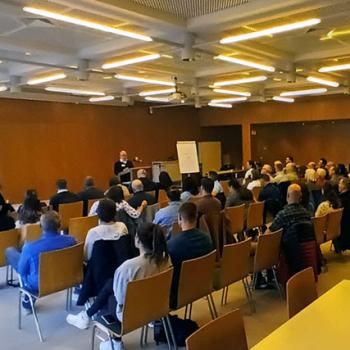Note: This article is published as a part of a symposium hosted by Patheos' Mormon Channel, entitled "The Mormon Moment."
In Mormon circles over the last year or so, a constantly quoted refrain—from the scriptural Doctrine and Covenants—has been the need to "bring [the Church] forth out of obscurity and out of darkness" (D&C 1:30). To a large extent this has happened, but not always in ways that make Latter-day Saints comfortable. We have long been accustomed to a carefully-controlled public image, from tightly choreographed biannual General Conferences to wholesome celebrities in sports and entertainment, and from scripted missionary lessons to temple open houses and savvy ad campaigns.
By contrast, the Romney campaign has thrown Mormons into the rough-and-tumble of politics; four of the top ten Google hits for "Book of Mormon" are to a decidedly non-official Broadway production; the Internet has made relatively obscure doctrinal controversies or embarrassing historical incidents available to middle-schoolers; and even our most sacred rituals are now posted on YouTube.
The good news is that people want to talk about Mormonism; the bad news is that we can no longer control the message. Instead, we are having actual conversations, both within and without the faith, in which follow-up questions are to be expected and it is no longer possible to simply dismiss criticisms as anti-Mormon prejudice. Among journalists, academics, co-workers, students, and neighbors, conversations often go something like this:
"Mormons are Christian."—"Yes, but not in a mainstream, orthodox way . . ."
"Mormons haven't practiced polygamy for over a century."—"Yes, but you still expect there to be polygamy in the afterlife, right?"
"The LDS Church is politically neutral."—"Yes, but aren't three-quarters of your members Republican? And can you name any local or general church leaders who are Democrats?"
"Black and white, bond and free, male and female . . . all are alike unto God." (quoting the Book of Mormon) - "Yes, but do you notice any patterns in this photo directory of Church leadership?"
"Mormons believe in the family."—"Yes, but why has your church actively opposed granting legal equality to families headed by gays and lesbians?"
"The Book of Mormon tells of Christ's visit to Israelite immigrants in the New World." - "Yes, but where are the archaeological or DNA traces of those immigrants?"
Instead of simple assertions, we have been asked to provide evidence, justifications, and explanations. It's exhausting, but it can also be revealing to see ourselves as others see us, and to have to think harder about our beliefs and commitments. What in our faith in non-negotiable? Which of our assumptions might be more culturally derived, and thus flexible? Are we really a Tea Party sort of church? And what does that mean at a time when the classic Republican demographic is a shrinking proportion of the electorate?
This last year has been a learning experience as we have started to speak more to outsiders in non-proselytizing ways, and as we have come to realize that not all Latter-day Saints see things as they do in Utah. So far, our side of the conversation has mainly been reactive and defensive. It seems that we have a lot of explaining to do.
In addition, the image we present to the world is rather nostalgic and sentimental. We're the Reader's Digest of churches, content with what has worked in the past and wary of what the future will bring. (Our idea of edgy is when the Mormon Tabernacle Choir sings songs from movie soundtracks.) There's something to be said for stable, steady conservatism. In fact, when our daughter went to college, we bought her a T-shirt that said, "I can't . . . I'm Mormon." But this, in the long run, is not a winning slogan.
The challenge going forward will be to explore our tradition and scriptures to discover positive, forward-thinking, distinctly Mormon contributions that can be made in larger cultural conversations. The messages that come from Salt Lake–the Church is true, be grateful, love your family, keep the commandments, help others, follow Jesus, God cares for you–have considerable pastoral value in the lives of Latter-day Saints and are attractive to many outsiders, but to make a difference in the world of thought and culture, we will need to learn the detailed, nuanced languages of theology, religious studies, politics, literature, law, public policy, and sociology, without simply echoing the positions of conservative American Evangelicals and Catholics.
The most recent Mormon Moment has given us a chance to join the conversation; now we just need to find our voices.
12/2/2022 9:09:20 PM




